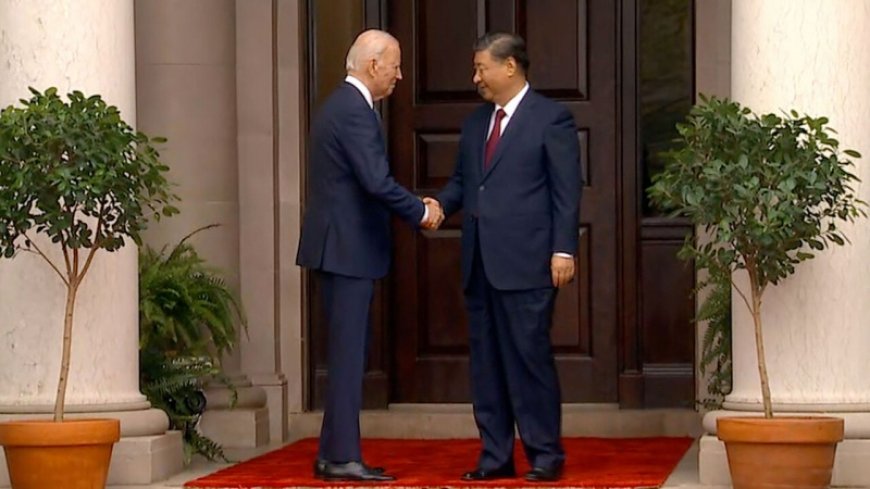China opposes formal contact between the US and Taiwan
China has stated that it is against the visit of the US Congress delegation to Taiwan and any official contact between Washington and Taipei.

TASS, reports that Liu Pengyu, the spokesperson of the Chinese Embassy in Washington, said: "Taiwan is an inseparable part of China. Beijing strongly opposes any official US contact with the Taiwan region. The US should respect the "one China" principle and the three declarations signed between Washington and Beijing."
The spokesperson of the Chinese embassy in Washington added. "The US should stop official communication with Taiwan, send false messages about 'Taiwan independence' and refrain from interfering in the elections of that region."
Referring to the holding of elections on the island of Taiwan on Saturday, US President Joe Biden said: "We do not support the independence of Taiwan." And Mike Johnson, the chairman of the House of Representatives of the US Congress, announced that he may visit Taiwan in May.
.The Chinese government has asked the people of the island of Taiwan not to vote for William Lai, the main candidate for the presidential election on the island. The general election is being held on the island today, Saturday, January 13. China believes that its victory will lead Taiwan down the path of military confrontation. The island of Taiwan has a population of 23 million. China considers the island to be a separate state, and recently President Xi Jinping of China emphasized that eventually the island of Taiwan will come under the control of Beijing and join the motherland of China.
The victory of William Lai in the presidential election of the island of Taiwan is causing great concern to the Beijing government because he is a person who is fighting for the secession of the island, where he is supported in that by Western countries, especially the United States. Taking into account that Taiwan is used by the United States as a tool to exert pressure against the Chinese government, Beijing has repeatedly warned Washington about the negative consequences of strengthening relations with the faction that supports the secession of Taiwan. Henry Kissinger, a leading US international affairs analyst who passed away recently, had also warned Washington against crossing China's red line on the issue. Lee T Wan, an expert on international affairs, says about the matter: "China has repeatedly warned the United States that Taiwan is a red line of its territory and that it will never relax its position on the matter. Even if the United States has always declared in empty words that it is implementing its promise to respect one China, but in practice it has been doing things contrary to that promise."
Therefore, Mao Ning, the Spokesperson of the Ministry of Foreign Affairs of China, on the eve of Taiwan's elections, has asked the United States to stop official communication with Taiwan and also to stop its interference in the island's elections, and at the same time to warn Washington about the negative results of that behavior. Mao Ning, Chinese Foreign Ministry Spokesman China has repeatedly emphasized that it strongly opposes any official interaction between the United States and Taiwan, and that members of the United States Congress should follow the principle of one China and recognize the provisions of the joint agreement between the United States and China. At the same time, due to concerns about the strengthening of China's position and the weakening of the United States at the international level, since the presidency of Barack Obama, Washington has been implementing policies to control and surround China politically, militarily, economically and technologically. In addition to sending US warships to China's coastal waters and forming a coalition to control Beijing, Washington also supports the movements of parties that want to isolate Taiwan, including the ruling Democratic Progressive Party. Li Song Zhuhua, an expert on international affairs, says about it: US politics is preoccupied with China and different issues, including Taiwan.
In fact, the US policy is to drag China into the arms race and at the same time increase the conflicts between it and Taiwan by supporting the movement to isolate the island, policies that have so far failed to achieve the intended goals against Beijing. In any case, the failure of the ruling Democratic Progressive Party in the local government elections has shown that the people of the island of Taiwan are against war and conflict and fueled by tensions with China, tensions that the party is currently monitoring. The issue has given the Chinese government hope that by warning the people of Taiwan about the negative results of the politics of raising tensions pursued by the ruling party, it will succeed in persuading the Taiwanese to cast their votes carefully and elect a person who will follow the path of strengthening cooperation and interaction with China. This is because the US is sending wrong and confusing signals to Taiwanese voters, which could have irreparable consequences for the Taiwanese people and Taiwan itself. However, the ruling Democratic Progressive Party expects that the support of the United States and the differences between Washington and Beijing will be to its advantage and ultimately lead to winning the election.













































